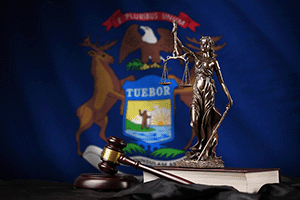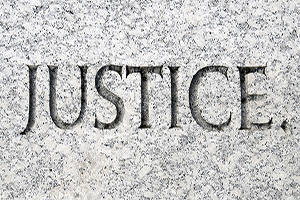Michigan Court Records Search
How to Run a Michigan Court Records Search
They Michigan state judicial system is structured similarly to every state in the nation. The courts determine who is guilty, or innocent, of a criminal or civil crime and what the respective punishments are. The ensuing criminal or civil convictions are considered a matter of public record, for the most part.
Running a Michigan court records search to find out about a person's criminal or civil case is a straight forward process. There are a few options on how to access this information. If you want to run a court case search, you will need to know a few things. The full name of the person in question, or the case number, or the names of their attorneys. You can run a Michigan court records search with any of these parameters.
The next step is to determine what information you are looking for, and what your intended uses are. For example, do you need official documentation of a person's conviction, or are you merely looking to verify someone's criminal history for unofficial purposes? This will determine what your options are for researching this information.

How to Conduct a Michigan Court Case Search
Conducting a Michigan court case search is a straightforward process. While there are multiple ways to search for this information, it requires accurate case information for a successful search. To search statewide, you can use the MI Judicial Website Portal. This portal provides access to a wide range of MI court case records. You will need to enter specific details about the case such as the name of the person of interest, their case number, or the calendar date the case was filed.
Here are the steps to conduct a MI court case search:
1). Visit the Judicial Website Portal.
2). Enter the case number, or the names of the parties involved, or the calendar date.
3). Click on the 'Search' button.
4). Review the search results and click on the relevant case for more details.
Remember, accuracy is key when conducting a records search. The more accurate your information, the more successful your search will typically be. If you are having a difficult time locating a specific record or information, you can contact the courthouse clerk for assistance.
Michigan Judicial Records and Public Access
Since most judicial records are public documents, anyone can run a MI court case search. They are accessible to anyone who wishes to view them. This is in line with the Freedom of Information Act (FOIA). The state's FOIA mandates that most judicial records should be open to the public. However, it's important to note that some restrictions apply. Certain types of court records may be exempt from public access due to privacy concerns.
Here are some key points to remember about public access to MI Judicial Records:
1). Judicial records are generally public and accessible.
2). The Freedom of Information Act (FOIA) governs public access to court records.
3). Some records may be exempt from public access due to privacy concerns.
4). Always check with the relevant court or legal authority to confirm accessibility.
Types of Courts in Michigan and Their Jurisdictions
The state's judicial system is hierarchical, like in every state. It consists of multiple judicial branches, each with its jurisdiction, and each hearing different cases. This hierarchy includes the following divisions; Supreme, Appeals, Circuit, District, Probate, and Municipal Courts. Each court hears specific types of cases, and deals with different levels of severity.
Here is a more detailed breakdown of the state's judicial branch divisions:
Supreme Division: The Michigan Supreme Court is the highest judicial branch division in the state. It hears cases that are significant and sets legal precedents and interprets state laws. This courthouse also supervises the work of all the lower courts. It ensures the entire judicial branch functions within the guidelines of the law.
Appeals Division: The Michigan Court of Appeals is the intermediate appellate courthouse. It also reviews decisions made by the lower judicial branch divisions. They are tasked with making sure that justice is served and that the law is correctly applied.
Circuit Division: MI Circuit Courts deal with mostly trials and hearings of general jurisdiction. They handle a wide range of cases, including felony criminal cases, civil cases, and bankruptcies.
District Division: MI District Courts have jurisdiction over misdemeanors and small claims and traffic violations. They also hear preliminary examinations in felony cases. They are the first point of contact for many Michigan residents involved in legal disputes of small monetary amounts.
Probate Division: MI Probate Courts handle matters related to wills, estates, and guardianships. They also deal with cases related to mental health issues. They also help ensure that the deceased's wishes are followed and help to protect vulnerable individuals that are involved.
Municipal Division: MI Municipal Courts handle local ordinance violations and minor infractions. They are the local courthouses for specific municipalities.
The Conviction Process in Michigan Courts
The conviction process in Michigan begins with an arrest, then booking into a county or city jail. The arrested individual is then arraigned and informed of the charges against them. Following arraignment, a preliminary review and pre-trial conferences take place. These proceedings determine if there is enough evidence for the case to proceed to trial. If the case goes to trial, the process may include jury selection, then opening statements, followed with potential witness testimony, and finally closing arguments. The jury or judge then decides the verdict and if that person is to be convicted of their criminal changes. If the defendant is found guilty, the next step in this process is the sentencing phase. The judge then considers various factors before deciding the appropriate punishment. This can include fines, penalties, restitution, and jail or prison time depending on the nature of the crime.
Navigating Privacy and Digitalization in Michigan Public Court Records
The digitalization of Michigan public court records has made access easier for everyone. However, there are privacy concerns that pertain to this. Certain types of records may have restrictions due to sensitive information. These might include cases including juveniles, sealed records, and those that have been expunged. Online portals and third-party public record databases have become key in facilitating online access to records. They provide quick access to a large amount of information.
These records will also show up if you decide to run a background check on someone. Whatever resource you obtain your information from, it's important to use it in a mindful fashion and in accordance with state laws.


